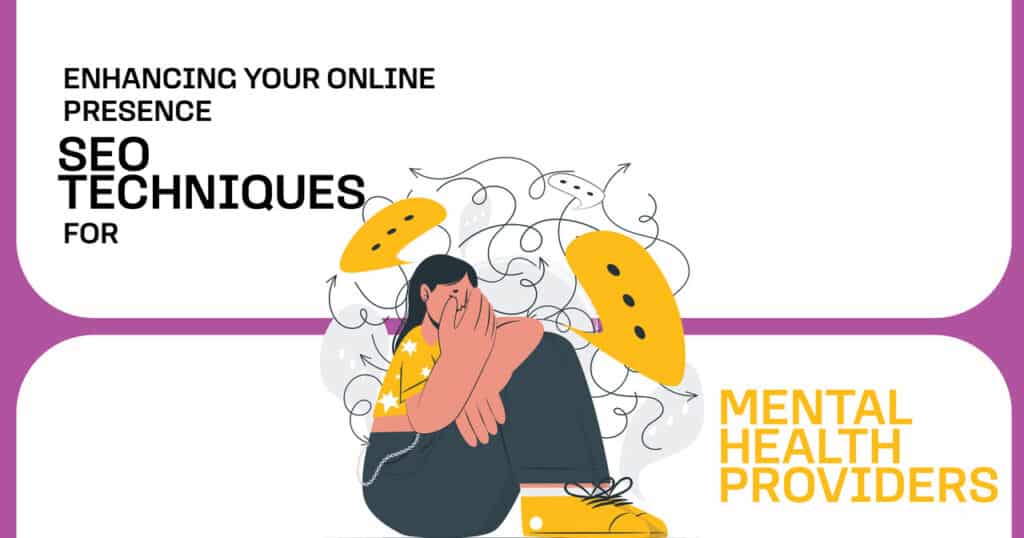In the digital age, having a solid online presence is crucial for mental health providers. Whether you’re a therapist, counselor, or psychologist, an optimized website can help attract new clients and grow your practice. This comprehensive guide will explore effective SEO techniques explicitly tailored to enhance mental health providers’ online presence.
Understanding SEO for Mental Health Providers
Search Engine Optimization (SEO) is the process of improving your website’s visibility on search engine results pages (SERPs). For mental health providers, SEO helps potential clients find your services online. By optimizing your website, you can rank higher in search results, attract more organic traffic, and ultimately increase your client base. Effective SEO strategies for mental health professionals are vital for establishing credibility and attracting potential clients.
On-Page SEO Techniques
Keyword Research
Keyword research is the foundation of any successful SEO strategy. Identify keywords that potential clients might use when searching for mental health services. Use tools like Google Keyword Planner, Ahrefs, or SEMrush to find high-traffic, low-competition keywords.
- Focus Keywords: These are the primary keywords you want to rank for, such as “mental health therapist,” “counseling services,” or “psychologist near me.”
- LSI Keywords: Latent Semantic Indexing (LSI) keywords are related terms that add context to your content, like “mental wellness,” “therapy sessions,” or “mental health support.”
Additional Tip: Using a keyword research tool can help you find long-tail keywords that are specific to your mental health practice, such as “child therapist in [Your City]” or “behavioral therapist for teens.” This targeted approach can attract ideal clients who are searching for specialized services.
Optimizing Meta Tags
Meta tags, including title tags and meta descriptions, are crucial in SEO. Ensure that your title tags are compelling and contain your primary keywords. Meta descriptions should be concise and informative, encouraging users to click on your link.
- Title Tag: “Experienced Mental Health Therapist | [Your City] | [Your Practice Name]”
- Meta Description: “Looking for professional mental health services in [Your City]? [Your Practice Name] offers expert counseling and therapy sessions. Contact us today.”
High-Quality Content Creation
Content is king in SEO. Create informative, engaging, and valuable content that addresses the needs and concerns of your target audience. This includes blog posts, articles, and informational pages about mental health issues and treatments.
- Blog Post Ideas:
- “10 Tips for Managing Anxiety”
- “How to Support a Loved One with Depression”
- “The Benefits of Cognitive Behavioral Therapy”
Additional Tip: Consistently publishing high-quality content not only improves your search engine rankings but also provides helpful content to your prospective patients. Share insights on how therapy sessions can benefit different demographics, such as couples therapy for relationship issues or anxiety therapy for stress management.
Internal Linking
Internal links help search engines understand your website’s structure and establish a hierarchy of importance. Link to other relevant pages within your site to improve user navigation and distribute page authority.
- Example: In a blog post about anxiety management, link to your service page on anxiety therapy.
Off-Page SEO Techniques
Building Backlinks
Backlinks are links from other websites to your site and are a significant ranking factor. Focus on acquiring high-quality backlinks from reputable mental health and healthcare sites.
- Strategies for Building Backlinks:
- Guest blogging on reputable mental health websites
- Collaborating with other healthcare providers for joint content
- Getting featured in online publications and news outlets
Additional Tip: Participating in online directories like Psychology Today, Healthgrades, and Yellow Pages can enhance your backlink profile. Additionally, submitting your practice to professional directories increases your visibility in search engine results.
Social Media Engagement
An active social media presence can drive traffic to your website and improve your SEO. Share your content on platforms like Facebook, Twitter, LinkedIn, and Instagram to reach a broader audience and encourage engagement.
- Tips:
- Post regularly and interact with your followers
- Share blog posts, articles, and updates about your practice
- Use relevant hashtags to increase visibility
Online Directories and Listings
Ensure your practice is listed in online directories and local listings such as Google My Business, Yelp, Healthgrades, and Psychology Today. Accurate and consistent information across these platforms can boost your local SEO and make it easier for potential clients to find you.
Technical SEO Techniques
Website Speed Optimization
A fast-loading website provides a better user experience and is favored by search engines. Use tools like Google PageSpeed Insights to analyze your site’s speed and identify areas for improvement.
- Tips to Improve Speed:
- Optimize images by compressing them without losing quality
- Minimize the use of heavy scripts and plugins
- Enable browser caching and use a content delivery network (CDN)
Mobile-Friendly Design
With more people using mobile devices to search online, having a mobile-friendly website is essential. Ensure your site is responsive and provides a seamless experience on all devices.
- Check Mobile-Friendliness: Use Google’s Mobile-Friendly Test tool to evaluate your site.
Secure Website (HTTPS)
Security is a critical factor for user trust and SEO. Ensure your website is secure by implementing HTTPS, which can be done by obtaining an SSL certificate.
Local SEO for Mental Health Providers
Google My Business Optimization
Google My Business (GMB) is a free tool for managing your online presence across Google, including Search and Maps. Optimize your GMB profile to improve your local SEO.
- Steps to Optimize GMB:
- Complete your profile with accurate and up-to-date information
- Add high-quality photos of your practice
- Encourage satisfied clients to leave positive reviews
Additional Tip: Engaging with positive reviews and addressing any negative feedback shows your commitment to excellent service, which can enhance your online reputation and attract more clients.
Local Keywords
Incorporate local keywords into your content to attract clients from your area. Include your city, neighborhood, or region in your keywords to improve local search visibility.
- Example Keywords:
- “mental health therapist in [Your City]”
- “counseling services near [Your Neighborhood]”
Reviews and Testimonials
Positive reviews and testimonials can significantly impact your local SEO. Encourage clients to leave reviews on your Google My Business profile and other review platforms.
- Tip: Respond to positive and negative reviews to show that you value client feedback and are committed to improving your services.
Content Marketing Strategies
Blogging
Blogging is an effective way to keep your website updated with fresh content and engage with your audience. Write about topics relevant to mental health, share personal insights, and provide valuable information to your readers.
- Blog Ideas:
- “Understanding the Different Types of Therapy”
- “How to Choose the Right Therapist for You”
- “The Impact of Stress on Mental Health”
Video Content
Video content is becoming increasingly popular and can help you connect with your audience on a deeper level. Create videos that address common mental health issues, offer advice, or share success stories from your practice.
- Ideas for Video Content:
- “Tips for Managing Stress and Anxiety”
- “Client Testimonials and Success Stories”
- “A Day in the Life of a Mental Health Therapist”
Webinars and Workshops
Hosting webinars and workshops can position you as an authority in your field and attract potential clients. These events provide valuable information and allow you to interact directly with your audience.
- Webinar Topics:
- “Coping Strategies for Anxiety and Depression”
- “Building Resilience During Challenging Times”
- “Mindfulness and Mental Health”
Measuring and Analyzing SEO Success
Google Analytics
Google Analytics is a powerful tool for tracking and analyzing your website’s performance. Monitor key metrics such as organic traffic, bounce rate, and conversion rate to understand the effectiveness of your SEO strategies.
- Key Metrics to Track:
- Organic Traffic: Number of visitors coming from search engines
- Bounce Rate: Percentage of visitors who leave your site after viewing only one page
- Conversion Rate: Percentage of visitors who take a desired action, such as filling out a contact form
SEO Tools and Metrics
Use SEO tools like Ahrefs, SEMrush, and Moz to track your keyword rankings, backlink profile, and overall SEO performance. These tools provide valuable insights and help you identify areas for improvement.
- Important Metrics:
- Keyword Rankings: Track the positions of your target keywords in search results
- Backlink Profile: Monitor the quality and quantity of backlinks pointing to your site
- Site Audit: Regularly conduct site audits to identify and fix any technical SEO issues
Conclusion
Enhancing your online presence through effective SEO techniques is essential for mental health providers looking to attract more clients and grow their practice. By implementing the strategies outlined in this guide, you can improve your website’s visibility, credibility, and user experience. Remember, SEO is an ongoing process that requires continuous monitoring and optimization. Stay up-to-date with the latest SEO trends and best practices to ensure your mental health practice remains competitive in the digital landscape.
Additional Tip: Working with an SEO expert or a digital marketing agency can streamline your SEO efforts and ensure that your mental health practice remains visible in search engine results. Effective keyword strategies, quality backlinks, and a well-optimized Google Business Profile are key components of a successful SEO plan.
FAQs
Why is SEO important for mental health providers?
SEO is crucial for mental health providers as it helps improve online visibility, attract potential clients, and establish credibility in a competitive digital landscape.
How can keyword research benefit my mental health practice?
Keyword research helps identify the terms potential clients use to search for mental health services, allowing you to optimize your content and attract targeted traffic.
What are the benefits of having a mobile-friendly website?
A mobile-friendly website provides a better user experience, improves search engine rankings, and increases the likelihood of visitors staying on your site and engaging with your content.
How do backlinks impact my website’s SEO?
Backlinks from reputable sites signal to search engines that your content is valuable and trustworthy, improving your website’s authority and search rankings.
What should I include in my Google My Business profile?
Include accurate contact information, business hours, a description of your services, and high-quality photos. Encourage clients to leave reviews and regularly update your profile to reflect any changes in your practice.







